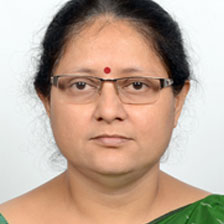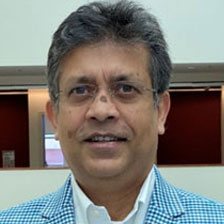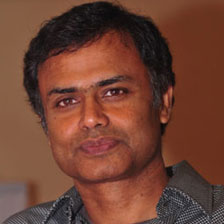


Keynote lectures :

Key Note- 1: Some Machine Learning Algorithms in Computational Biology
Date :19/12/2021
Time: 11:20-12:10
Sanghamitra Bandyopadhyay did her B Tech, M Tech and Ph. D. in Computer Science from Calcutta University, IIT Kharagpur and Indian Statistical Institute respectively. She then joined the Indian Statistical Institute as a faculty member, and became the Director in 2015, the first woman to occupy this position since the inception of the Institute in 1931. Since September 2020 she is continuing in her second tenure as the Director of the Institute. Her research interests include computational biology, soft and evolutionary computation, artificial intelligence and machine learning. She has authored/co-authored several books and numerous articles in journals, book chapters, and conference proceedings and has a citation h-index of 54. Prof.Bandyopadhyay has worked in many Institutes and Universities worldwide. She is the recipient of several awards including the Shanti Swarup Bhatnagar Prize in Engineering Science, TWAS Prize, Infosys Prize, Swarnajayanti fellowship, INAE Silver Jubilee award, several young engineer/scientist awards, Humboldt Fellowship from Germany, Senior Associateship of ICTP, Italy, and Dr. Shanker Dayal Sharma Gold Medal and Institute Silver from IIT, Kharagpur, India, She is a Fellow of the Indian National Science Academy (INSA), National Academy of Sciences, India (NASI), National Academy of Engineers (INAE), Institute of Electrical and Electronic Engineers (IEEE), The World Academy of Sciences (TWAS), International Association for Pattern Recognition (IAPR) and West Bengal Academy of Science and Technology. She has earlier served on the West Bengal Education Commission. Currently she serves on the Prime Minister's Science, Technology and Innovation Advisory Council (PM-STIAC).

Key Note- 2: Advancements and Translational Research on Imaging in Osteoporosis
Date :19/12/2021
Time: 18:00-18:50
Punam Kumar Saha is a tenured professor of Electrical and Computer Engineering and Radiology at the University of Iowa since 2013. His research interests include image processing, deep learning, artificial intelligence, and quantitative biomedical imaging. He has published over 115 papers in international journals and over 300 papers/abstracts in international conferences, holds numerous patents related to medical imaging applications, has served as an associate editor of Pattern Recognition and Computerized Medical Imaging and Graphics journals and in many international conferences at various levels. Currently, he is an Associate Editor of the IEEE Transactions on Biomedical Engineering and the Pattern Recognition Letters journals. He won the Young Scientist award from the Indian Science Congress Association in 1996 and the CoE Faculty Excellence Award for Research at the University of Iowa in 2020. He has received several grant awards from the National Institute of Health, USA. He is a Fellow of the Institute of Electrical and Electronics Engineers (IEEE), American Institute for Medical and Biological Engineering (AIMBE), and International Association for Pattern Recognition (IAPR). He has served as a member of several IEEE and AIMBE Fellow committees.

Key Note- 3: In-Memory Computing based Machine Learning Accelerators: Opportunities and Challenges
Date :20/12/2021
Time: 09:00-10.00
Kaushik Roy received B.Tech. degree in electronics and electrical communications engineering from the Indian Institute of Technology, Kharagpur, India, and Ph.D. degree from the electrical and computer engineering department of the University of Illinois at Urbana-Champaign in 1990. He was with the Semiconductor Process and Design Center of Texas Instruments, Dallas, where he worked on FPGA architecture development and low-power circuit design. He joined the electrical and computer engineering faculty at Purdue University, West Lafayette, IN, in 1993, where he is currently Edward G. Tiedemann Jr. Distinguished Professor. He also the director of the center for brain-inspired computing (C-BRIC) funded by SRC/DARPA. His research interests include neuromorphic and emerging computing models, neuro-mimetic devices, spintronics, device-circuit-algorithm co-design for nano-scale Silicon and non-Silicon technologies, and low-power electronics. Dr. Roy has published more than 800 papers in refereed journals and conferences, holds 28 patents, supervised 91 PhD dissertations, and is co-author of two books on Low Power CMOS VLSI Design (John Wiley & McGraw Hill).
Dr. Roy received the National Science Foundation Career Development Award in 1995, IBM faculty partnership award, ATT/Lucent Foundation award, 2005 SRC Technical Excellence Award, SRC Inventors Award, Purdue College of Engineering Research Excellence Award, Outstanding Mentor Award in 2021, Humboldt Research Award in 2010, 2010 IEEE Circuits and Systems Society Technical Achievement Award (Charles Desoer Award), IEEE TCVLSI Distinguished Research Award in 2021, Distinguished Alumnus Award from Indian Institute of Technology (IIT), Kharagpur, Fulbright-Nehru Distinguished Chair, DoDVannevar Bush Faculty Fellow (2014-2019), Semiconductor Research Corporation Aristotle award in 2015, and best paper awards at 1997.
International Test Conference, IEEE 2000 International Symposium on Quality of IC Design, 2003 IEEE Latin American Test Workshop, 2003 IEEE Nano, 2004 IEEE International Conference on Computer Design, 2006 IEEE/ACM International Symposium on Low Power Electronics & Design, 2005 and 2019 IEEE Circuits and system society Outstanding Young Author Award (Chris Kim, AbhronilSengupta), 2006 IEEE Transactions on VLSI Systems best paper award, 2012 ACM/IEEE International Symposium on Low Power Electronics and Design best paper award, 2013 IEEE Transactions on VLSI Best paper award. Dr. Roy was a Purdue University Faculty Scholar (1998-2003). He was a Research Visionary Board Member of Motorola Labs (2002) and held the M. Gandhi Distinguished Visiting faculty at Indian Institute of Technology (Bombay) and Global Foundries visiting Chair at National University of Singapore. He has been in the editorial board of IEEE Design and Test, IEEE Transactions on Circuits and Systems, IEEE Transactions on VLSI Systems, and IEEE Transactions on Electron Devices. He was Guest Editor for Special Issue on Low-Power VLSI in the IEEE Design and Test (1994) and IEEE Transactions on VLSI Systems (June 2000), IEE Proceedings -- Computers and Digital Techniques (July 2002), and IEEE Journal on Emerging and Selected Topics in Circuits and Systems (2011). Dr. Roy is a fellow of IEEE.

Key Note- 4: How to Look into the Box without Opening it: Active Learning for Hidden Query Extraction
Date :21/12/2021
Time: 09:00-10.00
Jayant Haritsa is a Senior Professor in the Department of Computational and Data Sciences (CDS) and Department of Computer Science and Automation (CSA) at the Indian Institute of Science (IISC), Bangalore. He received a B. Tech degree from the Indian Institute of Technology (Madras), and MS and PhD degrees from the University of Wisconsin (Madison). He joined IISC as faculty member in 1993. He has received many prestigious awards and fellowships including Research awards from IBM, Google, HP, Distinguished Alumnus from IIT, Madras, IISc Alumni Award for Excellence in Research for Engineering, Swarnajayanti Fellowship, DST, Govt. Of India, Santi Swarup Bhatnagar Prize in Engineering Sciences from CSIR, Govt. of India, Infosys Science Foundation Prize, J. C. Bose National Fellow, DST, Govt. of India. He is a Fellow of ACM, IEEE, INSA, IASc, INAE and NASI. His primary research interest is designing and analysis of Data Base System.